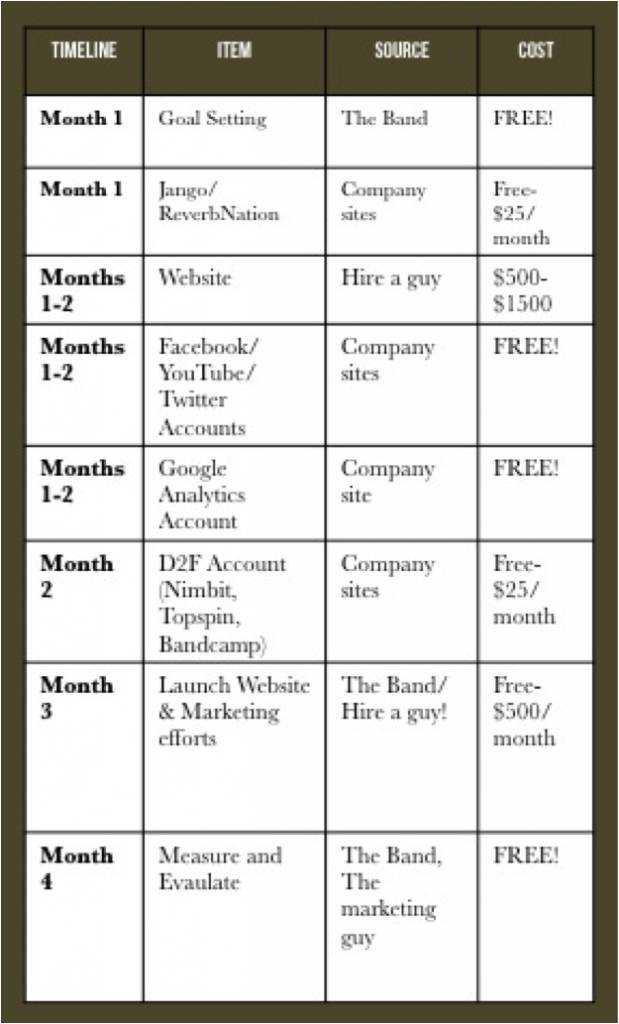
War is Hell. Prepare Accordingly.
Livingston Taylor often tells his students, “In the classroom you’re my student. Outside the classroom, you’re my enemy.” While somewhat harsh, he’s being completely honest. If you’re a musician, and he’s a musician, you’re competing for fans.
The Beatles were your heroes – now they’re the enemy! It’s enough to make you wish you’d studied harder in high school, right?
OK – maybe that’s a bit of an exaggeration, but it’s true. When you decide to become a professional musician, suddenly your music and marketing need to be not just enough to validate your efforts, but they need to make someone choose you over the other guy. And yeah, that other guy can be the Beatles.
Standing out and rising above the competition is the work of marketing. Again, we’re not going to give you the tired adage of “don’t suck,” but you’re gonna need to start thinking about a whole bunch of things above and beyond “just” the music.
First things first, do you have music? It’s hard to be a musician without it. When you try to book gigs for your band, the first thing they usually ask for is … music! Shocking, I know. You’d be surprised how many bands wither on the vine simply ‘cuz they’ve got nothing recorded but still try to market and promote themselves.
Think about what you’re recording. If you’re heading into the studio to record your debut effort, nobody expects you to already have an album. But you could have some demos, or maybe a previous band’s project that spotlights your abilities. There’s enough technology in your iPhone to record a decent quality audio demo and an HD video. Scary, but true.
Now assuming you’ve got some music, it’s time to have a goal. This doesn’t have to be some multi-leveled super sophisticated statement of purpose, but it should get you through 3-months, 6-months, and a year or two. When you can create and attain specific goals, there’s a feeling of progress and success that’s unstoppable. That’s not to say you should lowball your goals to make them easy to meet, but you shouldn’t expect to sell a million records in 8 months either.
I once fired a client (and yes, smart consultants know when to do such things!), because he knew how he wanted to treat his fans. He would often say things like “when I’m a star, I’ll talk to every fan. I won’t let anyone feel like they don’t know me.” While that’s great sentiment, it doesn’t help you when it takes you two weeks to deliver a two paragraph blog post for your new website. Again, setting clear goals helps roadmap what needs to be done, who’s going to do it, and when it should be done. You’ve got to be able to see the forest for the dive bars.
Goals should be realistic and tied to the amount of effort you legitimately expect to put in. For example, if you plan to launch a website in two months time, then you should probably expect to have music ahead of the launch.
And yeah, you’ll need a little bit of money. Not thousands of dollars, but at least enough to allow yourself to capitalize on opportunities that arise and create the bare bones (online) foundation.
The following image offers a timeline that represents a basic attempt at wrapping your heads around the pacing and protocol of where your real-world goals line up with what you’re going to be dealing with online to make them happen.
While every item on the table is important, it’s worth drawing special attention to Month 4 where you’ll measure and evaluate everything you’ve done to date.
One of the main issues with any new business (or band!) is that without constant forward momentum you feel like there’s no success. More bluntly, if we’re not growing, we’re not succeeding.
While that’s true to a certain extent, you need to stop and make sure that everything works and has the potential to lead to the success you crave. It can’t be “hurray – the website’s done, let’s go look at Facebook now.” In Month 4 you’re giving extra special attention to your sales, your combined analytics data, and your own thoughts on what’s working well. It’s likely you’re looking at these things anyway, but often it takes a month (post-launch) to get a reasonably solid set of numbers to use as reference.
Also – this table represents a calendar that works for a lot of people. Any individual piece may stretch or contract depending on the unique specialness that represents your band.


